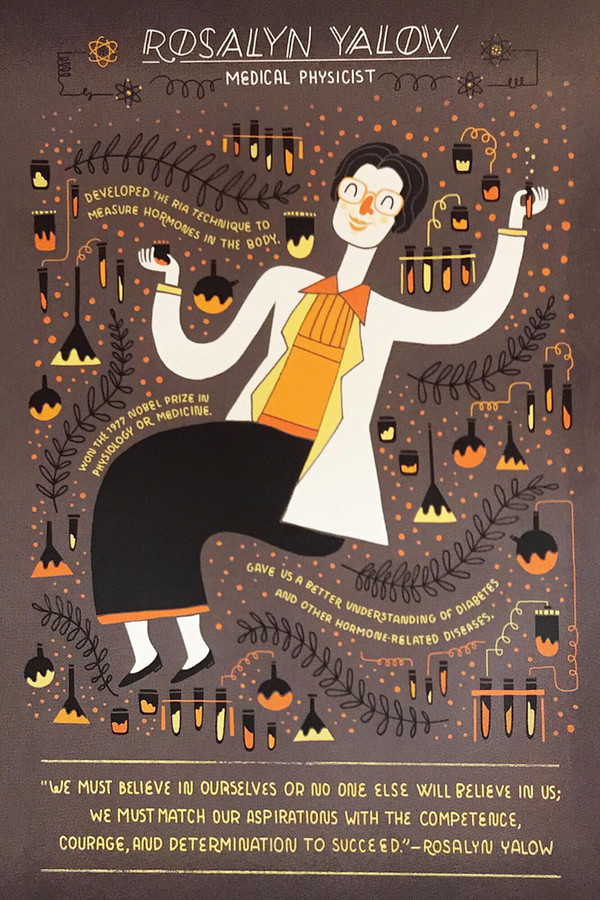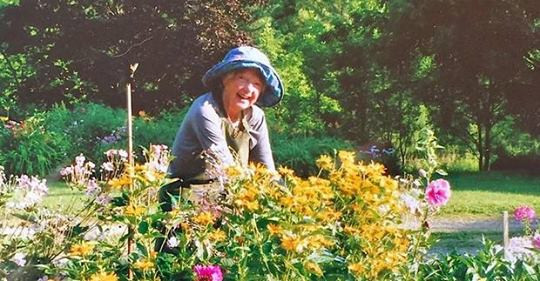Gwyneth Anne MacMillan is a PhD candidate in Biology at the University of Montreal studying pollution in the Arctic. She has a Bachelor of Science (Honors) in Biology and Anthropology from the University of Western Ontario and a graduate diploma in Environment and Sustainable Development from the University of Montreal. She also sits on the board of the Association of Polar Early Career Scientists (APECS) Canada. Gwyneth enjoys reading and loves being outside, especially in the winter!
I recently stumbled across a set of postcards online called “Women in Science: Fifty Fearless Pioneers Who Changed the World” which were beautifully drawn by the author and illustrator Rachel Ignotofsky. A large stack of postcards soon arrived at my door, with illustrations of woman scientists urging me to believe, explore, fight, and - above all - persevere on my path as a scientist. “We must believe in ourselves, or no one else will believe in us;” implored the physicist Rosalyn Yalow floating on a background of yellow and orange test tubes, “we must match our aspirations with the competence, courage, and determination to succeed.”

Illustration by Rachel Ignotofsky (Source: Women in Science: Fifty Fearless Pioneers Who Changed the World).
Few of these pioneer’s names were familiar to me. Despite my more than decade-long education in the natural sciences, I only recognized the faces of Marie Curie, Rachel Carson, and Jane Goodall, three women who have inspired countless others. But who were these other fearless pioneers looking out at me? Why had I never heard of Hypatia, Florence Bascom, Marjory Stoneman Douglas, Gerty Cori, Cecilia Payne-Gaposchkin, Mae Jemison, Vera Rubin, Jocelyn Bell Burnell and all the rest?
Seeing all these cards spread out on my desk really brought home to me the lack of recognition for women’s contributions to our modern scientific world. Legions of women have dedicated themselves to the pursuit of science, spending years of their lives hunched over microscopes, herbariums, and scribbled calculations. Yet they have often received little recognition or credit for their work.
Even today, a woman training in STEM (science, technology, engineering and math) may often feel discouraged by the ordinariness of all-male plenaries, committees, and panels on “women in math”. I have often felt alone as a woman scientist while working in remote places in the Arctic, or closer to home contemplating the long line of black-and-white photos of male department heads at my university. Receiving these cards of women scientists filled me with admiration and hope. Gathered together on my desk, they made me feel less alone. I quickly sent all the images of women in medicine to my sister, so that she could also feel a little less alone as she poured over her medical textbooks.
Lack of recognition for their work also meant that these women in science were unknown to me as I was growing up. I had to look for role models in my home life. Luckily, I found heroines all around me. Pippi Longstocking, the strongest girl in the world who rode her pet horse around bareback. My mom, a microbiologist, brought home petri dishes for us to lick and then cultivate in the fridge. Nancy Drew, an independent girl who spent her free time solving mysteries. My pediatrician, who bustled around her office measuring us and sampling our blood. My aunties, who published books and spoke on TV about serious things. And especially my grandmother Eluned, my Nain, who taught me the names of birds and wildflowers.
My Nain’s gift to me was determination. I am not sure how she gave me this gift, but I think of her whenever someone says that I am very determined. Although you may not have heard of her, my grandmother was a hero who made environmental history. She was a conservationist who led the efforts to preserve the Niagara Escarpment. She was a “warrior who laid low the anti-preservationist of her day”.
She was incredible. She showed me how to prune trees down to their bare bones to help them flourish. She forced me to grit my teeth and wade into leech-filled ponds. She was the only person to read all 50 pages of my doctoral research proposal (overnight), aside from my thesis committee, and I’m not even sure that my committee read the whole thing. “I enjoyed reading your thesis proposal,” my Nain wrote me, “and understood quite a lot of it thanks to my scientific training of 65 years ago!!!”.
My grandmother studied medicine at university, but then there was the war, her husband far away at sea, and her young family. I suppose she faced many of the same choices women in science still struggle with today. She graduated with a bachelor of science in 1942 and then she became a wife and mother, channeling her remarkable intellect and energy into other passions. She raised five children, a magnificent garden, and hives of busy honeybees. She explored the world and brought me back fossils from ancient seas. She wrote book reports for the university courses that she was auditing well into her 90s. She joined rallies, led delegations, organized coalitions, wrote letters, and hounded bureaucrats in her fight to preserve the ecologically-sensitive Niagara escarpment and to create Ontario's modern greenbelt. She was an unsung environmental hero. But my Nain wasn’t motivated by mere recognition, she was aiming for a far loftier goal; preserving the natural world for her grandchildren and great-grandchildren.
There are probably many reasons why the unsung heroines of science continued their work despite lack of recognition, credit or encouragement. Perhaps, like my grandmother, all these fearless pioneers were not doing it for recognition but for loftier goals. As Ada Lovelace said to me from her card, “For the unseen worlds around us, the worlds of science”.
As I finish my PhD in environmental science, I can think of many reasons why I do what I do. I love research: the intellectual freedom, the sense of discovery, the endless questions, and the physical challenge of fieldwork. I love learning new ways of observing the natural world, under a microscope, from a satellite, by chatting with other scientists or by working side-by-side with indigenous communities. I love science. But really the reason that I do what I do is because I am determined to help preserve the birds and wildflowers that my grandmother loved so much.

Eluned tending to flowers in her garden, now the MacMillan Farm nature reserve in the city of Vaughan, Ontario
